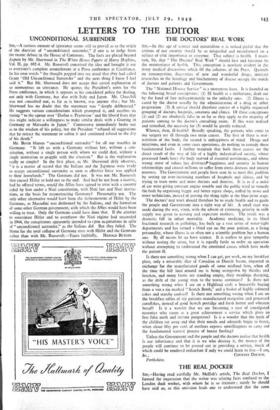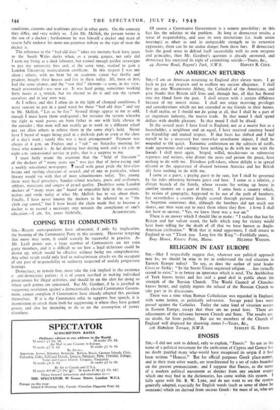THE REAL DOCKER SIR,—Having read carefully Mr. MeUish's article, The
Real Docker, I formed the impression that the writer was relating facts confined to the London dock worker, with whom he is so intimate ; surely he should have said so, as this omission leads one to understand that the same
conditions, customs and traditions prevail in other ports. On the contrary they differ, and very widely so. Like Mr. Mellish, the present writer is the son of a docker ; furthermore he was himself a docker and must of course fully endorse his none-too-generous tribute to the type of man the docker is.
The reference to the "bad old days" takes my memory back forty years to the South Wales docks when, as a young ganger, not only did I earn my living as a dock labourer, but earned enough golden sovereigns to pay my university fees and, at the same time, studied to gain a London University matriculation certificate. In this respect I was not alone ; others, with no bent for an academic career but thrifty and prudent, bought their houses and live in them today. All, more or less, had the same chance, and the "raw deal element—a term, in my view, much overworked—was non est. It was hard going, sometimes working forty hours at a stretch, but we elected to do it and ran the system ourselves and in our own way.
As I reflect, and this I often do in the light of changed conditions, I must venture to put in a good word for those "bad old days" and say to Mr. Mellish, "Let us be fair." Several things appear to me as odd, though I must kave them undisputed ; for instance the system whereby the right to work passes on from father to son with little chance to the outsider ; that men will not readily go to work in a different wharf nor yet allow others to relieve them in the same ship's hold. Never have I heard of wages being paid in a dockside pub or even at the close of a day's work ; surely this was a local arrangement? Payment was always at 4 p.m. on Fridays and a " sub " on Saturday morning for those who wanted it. As for drinking beer during work and a six a.m. to eight a.m. concessional service in pubs, that is a surprise to me. I must hotly resent the assertion that the "field of literature" of the dockers of "many years ago" was just that of horse-racing and a weekly sensational newspaper. recall with great pride the first-class brains and sterling character of several, and of one in particular, whose library would vie with that of most schoolmasters today. Yes, among them were local preachers, Sunday-school teachers, poets and craftsmen, athletes, musicians and singers of grand quality. Doubtless some London dockers of "many years ago" found an enjoyable field in the acaclemi.: realms and smile today at what Mr. Mellish has to say about them. Finally, I have never known the dockcrs to be referred to as "the cloth cap crowd," but I have heard the claim made that to become a docker is to ascend a necessary step towards the completion of one's education.—I am, Sir, yours faithfully, ACADENIICIAN.



































 Previous page
Previous page